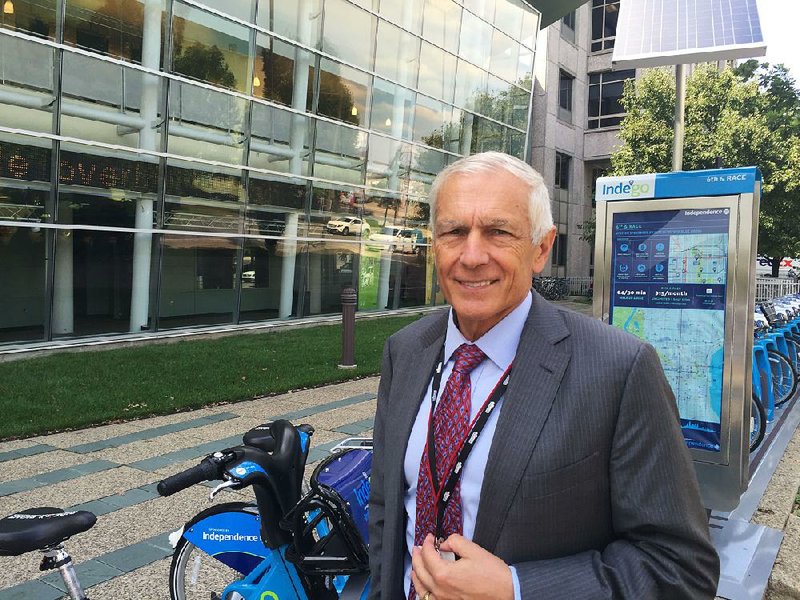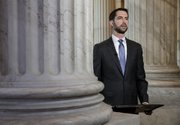WASHINGTON -- It was a bad idea for the United States to draw a red line in Syria, show it to the world and then fail to take action once the line had been crossed, former NATO Supreme Allied Commander Wesley Clark and an Arkansas lawmaker said Friday.
RELATED ARTICLES
http://www.arkansas…">Allies back U.S. strike; Russia vexed http://www.arkansas…">What's war weighs on legality of strike http://www.arkansas…">Text of Trump’s statement after strikes
"I'm against red lines, drawing red lines in principle. In my experience, in my study of foreign policy, I haven't seen the red lines to be useful when publicly disclosed," Clark said in a telephone interview.
At an August 2012 White House news conference, President Barack Obama said he had not "ordered military engagement" in Syria but would re-evaluate if Assad used any chemical weapons.
"We have communicated in no uncertain terms with every player in the region that that's a red line for us and that there would be enormous consequences if we start seeing movement on the chemical weapons front or the use of chemical weapons," the president said.
[PRESIDENT TRUMP: Timeline, appointments, executive orders + guide to actions in first 100 days]
The red line was subsequently crossed when sarin gas was used in the suburbs of Damascus in August 2013. The attack, which the U.S. and others blamed on Assad, killed more than 1,400 people.
Instead of retaliating, the U.S. agreed to let Syria voluntarily give up its chemical weapons stockpile.
The war -- and the use of nerve gas -- has continued.
This week, at least 86 more civilians perished after chemical weapons were deployed in a rebel-controlled area.
Asked about the decision to forgo a military response in 2013, Clark said, "I do think that it was a mistake. ... [The U.S.] should not have drawn the red line and then backed away from it."
The U.S. "certainly" was capable of launching a similar strike in 2013, he said.
Thursday's strike, Clark said, was "an appropriate reaction, but the question is: Is it a one-off strike or is it a change in policy?'"
The White House has sent conflicting signals thus far, Clark said.
"A few days ago, the administration seemed to say ... 'We're going to leave Assad in power,'" Clark said. "Then the pictures show up. We do a strike on an airfield, destroy some aircraft, and now people are saying, 'Get rid of him.'"
It's unclear how President Donald Trump plans to handle Syria moving forward, he said.
"It could be a very consequential decision if it leads to a deeper, more costly, more risky American engagement in the region," he said. "It also could be a one-off strike after which business-as-usual continues. We just don't know at this point."
If the administration wants to alter the nation's Syria policy, it shouldn't do so unilaterally, he said. "They have to go to the Congress. They have to come to the American people and explain it. You can't do this in secret."
Americans don't like the Syrian ruler, but "they're reluctant to send their sons and daughters to war again in the Middle East," he added.
Thursday's military strike has been praised by members of the Arkansas congressional delegation.
"I, of course, supported strikes against the outlaw Assad regime in 2013, and President Obama walked away from his own red line," U.S. Sen. Tom Cotton said Friday. "I'm glad we now have a president who will act decisively when confronted with this kind of barbaric attack and threats to the United States' interests."
Thursday's missile launch "sends the right message to friend and foe alike that the United States will use our unmatched power to protect our own interests and to protect our allies around the world," he said.
In an interview, U.S. Sen. John Boozman said Thursday's attack on Syria was appropriate and "sent a clear message."
But the Republican from Rogers doesn't want Trump to act unilaterally as he confronts Assad.
"In the future, if additional measures are needed, I think he should come to Congress and seek approval if there's going to be an escalation," he said.
Trump's actions have been welcomed by Syrian emigres with Arkansas ties.
University of Arkansas associate professor Najib Ghadbian, the anti-Assad Syrian National Coalition's special representative to the United States and the United Nations, said the strike has captured the attention of the Assad regime.
"Of course, they were emboldened by the lack of leadership [from] the previous administration," he said. "Now that has changed."
Mouaz Moustafa, executive director of the anti-Assad Syrian Emergency Task Force and a University of Central Arkansas graduate, said Trump is showing more leadership than Obama ever did.
"This president learned in three months a lesson that his predecessor did not learn in six years," the former Hot Springs and Fort Smith resident said. "The fact is that chemical weapons being used is strictly a red line for the civilized world."
Metro on 04/08/2017


